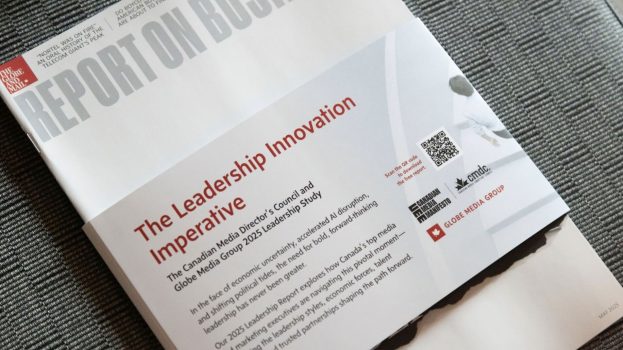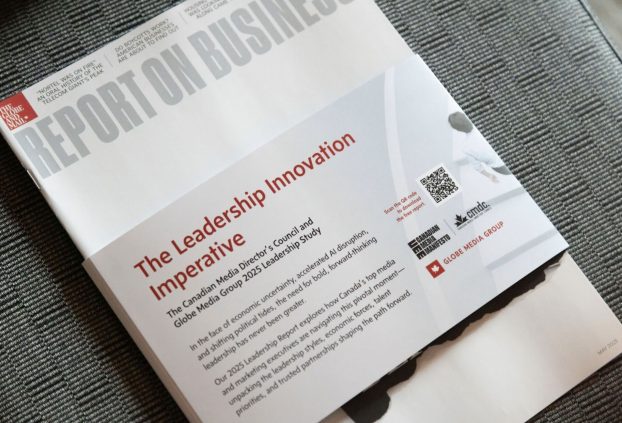In this special report, Strategy explores the Vancouver market through the experiences of seven marketers.
Each talks about the characteristics of the company’s target group (young adults, environmentalists, sports enthusiasts, recent immigrants, and so on) and outlines what it is doing to address their needs.
As well, on page 36, the report includes statistics culled from a media and market research survey commissioned by the Vancouver Area Newspaper Network.
The report starts on this page with the B.C. Dairy Foundation and continues on pages 32-39, with Mohawk Oil, the Hongkong Bank of Canada, bc tel, u. tv, Whistler Mountain Ski Corp. and Richmond Savings.
Older teens and young adults in the Vancouver market are stressed out and place a high premium on relaxation, achievement and maintaining one’s individuality, research conducted for the B.C. Dairy Foundation shows.
The findings are the result of four focus groups conducted this September by market research company Canadian Facts.
34 participants
A total of 34 milk drinkers between the ages of 18 and 24 participated in the discussions.
Participants represented a broad range of occupations, including students, a bicycle courier, a carpenter, a lawyer, and the unemployed.
George Vernon, general manager of the foundation, which represents the province’s 1,200 milk producers and processors, says the research shows the late teen/ young adult market is ‘extremely frustrated with the lack of opportunities available to them.’
‘I have two kids in college,’ Vernon says.
Same attitude
‘We were personally thinking our kids were different, but after watching all our focus groups, they all had the same attitude,’ he says.
‘An attitude that says they couldn’t measure up and wouldn’t have the chance to measure up.’
That sense of frustration has its roots in many sources, says a summary of the findings, but is largely the result of a chronically weak job market.
The report states:
‘With the job market becoming increasingly competitive over a dwindling number of positions, with an increasing number of immigrants bringing a new level of tenacity and willingness to work to the scene, and with the character of applicants typically shifting toward being over-qualified rather than under-qualified, these young people now recognize that they simply must be better-educated to even stand still in terms of job opportunity.’
As a result, the report says those in their late teens and young adults are spending long hours at school and at work, with no assurance they will be better off or even as well off as their parents.
As one participant said: ‘Between 20 and 30 [years of age], there’s a huge group of people that have nothing. We have no hope of getting what our parents actually got from life.’
Compounding the sense of frustration are characteristics common to city-living: overcrowding, violence, and a sense that community and family values are weakening, the report says.
Cost of living
As well, the high cost of living is taking a toll.
Participants repeatedly stated it was too expensive to go to the movies, to go to clubs, to travel, to buy compact discs and other lifestyle items.
Consequently, participants in the focus groups said they place a high premium on achievement.
‘It is acceptable – in fact, even cool – to be aggressive, to be a go-getter, in order to achieve your goals,’ the report says.
‘There were numerous examples of young people pushing themselves to attain what they want out of life, working two jobs to put themselves through college, obtaining the excellent grades needed for acceptance at very selective colleges, working a double major, etc.,’ it says.
Relaxation
While they push themselves hard, participants in the focus groups said they also placed a high premium on relaxation.
Many said in their off-hours, they like to sleep or watch tv, especially comedies, or talk shows such as Oprah Winfrey and Phil Donahue and Star Trek: The Next Generation.
They also like to socialize, in many cases by going to nightclubs, however, alcohol consumption within the group is down.
‘It’s no longer seen as `cool,’ ‘ he says. ‘I don’t know if that’s unique to b.c. They did mention that even if they wanted to [consume alcohol], they don’t have the money to do it.’
Vernon says another way they relax is by getting away to the mountains, adding there is an attempt by Vancouver young people to balance work and play.
Despite the values that appear to link the target group, participants placed a lot of importance on individuality, on being oneself.
‘Nowadays, what’s cool is `whatever’s cool for you,’ ‘ the report says.
‘It’s important to do what you want to do as long as it makes you happy, and as long as you don’t have to unfairly step on someone else to get what you want,’ it says.
No group identity
This sense of individualism stems from the fact that late teens and young adults have no group identity like that of hippies, yuppies or baby boomers, it says.
As one participant put it: ‘I find nothing really to identify with. We don’t really have our identity like other generations did.’
Vernon says the report confirms many of his assumptions about the target group.
‘There were no great surprises, other than the fact that over the last few years, the lower end of the target group are reflecting the times more,’ he says.
‘They don’t have a frivolous, `I-don’t-care attitude. They are very much more serious [than they used to be.] They are quite up on environmental issues and social issues, and they seem to be much more into trying to help their fellow human beings.’
‘I truly believe that attitudes here are similar down the west coast to California,’ he says. ‘My colleagues [in other parts of Canada] tell me the kooky ideas, the trends, begin in b.c.’
Vernon says the focus group testing confirms the dairy foundation’s long-term positioning line `Maintain Your Cool’ is still relevant, despite changing definitions of the word `cool.’
As the report explains: ‘Whereas cool once meant being laid back and relatively passive, today’s young people appear to find it not only acceptable, but even admirable, to overcome the odds and take on the tough challenges, to realize that the achievement of life goals demands both a plan and hard work.
‘Whereas cool once meant adhering to accepted norms of coolness determined by some aggregate youth identity, today’s young people see themselves as having no such group identity,’ it says.
As a result, the foundation has instructed its advertising agency, Vancouver-based McCann Erickson Advertising, to prepare concepts using the ‘Maintain Your Cool’ positioning for focus group testing the third week of November.
Vernon says those that perform well will form the basis of the foundation’s 1993 advertising campaign.
The foundation adopted the ‘Maintain Your Cool’ line in 1987.
Vernon says the foundation relies heavily on research for its advertising direction, crediting its benchmark research with the foundation’s decision to switch to lifestyle advertising back in 1983.
‘Until that point, most dairy advertising extolled the virtues of the product, and it wasn’t working,’ he says.
‘Our original research told us milk consumption drastically declined at the age of 18. These kids were becoming more independent and making their own decisions.’
They were rebelling against what they had been told at home – ‘Drink your milk, it’s good for you.’
So Vernon says the dairy foundation embarked on ‘lifestyle advertising.’
The strategy has been successful.
Vernon says sales of milk in the province have increased for eight consecutive years.
As well, the latest consumption research, conducted on behalf of the Dairy Bureau of Canada, shows b.c. residents consume more milk per capita than any other province.























